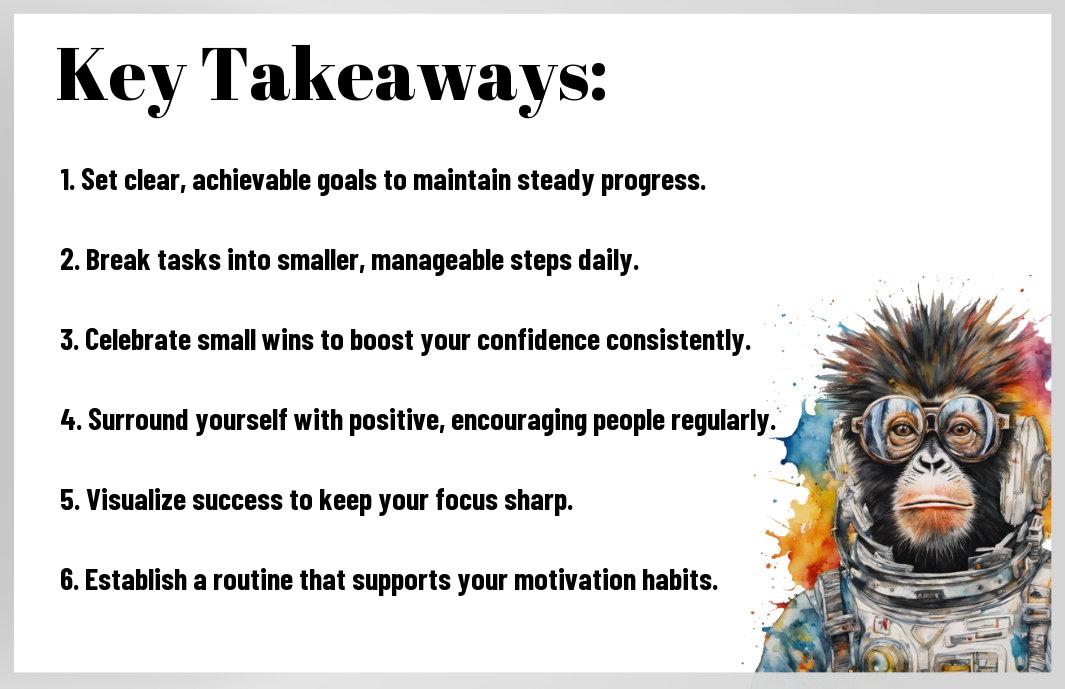You often face challenges that test your drive, but maintaining motivation consistently can transform your daily routine and long-term goals. Understanding practical strategies to boost your enthusiasm ensures you remain focused and energized, even when obstacles arise. This guide explores effective techniques tailored to help you build habits that sustain motivation, empowering you to achieve more with confidence and clarity. By integrating these methods into your life, you can develop a resilient mindset that keeps you moving forward regardless of setbacks or distractions.

Key Takeaways:
- Set clear and achievable goals to maintain focus and a sense of purpose daily.
- Establish a consistent routine that incorporates regular breaks and rewards to sustain energy and enthusiasm.
- Surround yourself with positive influences and seek inspiration from various sources to keep motivation high.
Harnessing the Power of Routine
Your daily habits form the backbone of sustained motivation. Consistency in routine reduces decision fatigue, freeing mental energy for meaningful tasks. By structuring your day with deliberate actions, you create a reliable environment that supports productivity and enthusiasm. This regularity helps transform intention into momentum, making motivation a natural byproduct rather than a forced effort. https://roshorn.com/product/10-ways-to-stay-motivated-every-day/
Designing Your Daily Framework
Craft a framework that aligns with your personal and professional goals. Begin by blocking out time for high-priority tasks when your energy peaks, like tackling complex projects mid-morning. Incorporate short breaks to prevent burnout, and reserve evenings for reflection or light activities. Using tools like time-blocking calendars or productivity apps ensures you stay on track, adapting your day to balance focus and flexibility.
The Role of Morning Rituals in Motivation
Starting your day with intentional rituals primes your mind for productivity. Whether it’s a brief meditation, journaling, or a quick workout, these rituals signal your brain to shift into an active, goal-oriented state. For example, studies show that people who engage in morning routines report increased alertness and reduced stress, which directly fuels motivation throughout the day.
Diving deeper, morning rituals cultivate a sense of control and readiness. Athletes, like tennis champion Serena Williams, swear by consistent morning practices to set a winning mindset before competition. Your ritual might include reviewing daily goals or practicing gratitude, which psychologically centers you and strengthens resolve. These small, repeatable actions build a momentum that carries you through challenges and keeps your motivation anchored.

The Science of Goal Setting
Setting goals activates the brain’s reward system by releasing dopamine, which enhances motivation and focus. Neuroscience reveals that clearly defined objectives help you sustain effort over time and resist distractions. When goals align with personal values, you tap into intrinsic motivation, making the pursuit more fulfilling. Studies indicate that visualizing success paired with specific steps increases the likelihood of achievement by up to 42%. Understanding these mechanisms empowers you to structure your ambitions realistically and maintain momentum, transforming motivation from a fleeting impulse into a consistent force driving your daily actions.
SMART Goals: Crafting Clear Targets
SMART goals—Specific, Measurable, Achievable, Relevant, and Time-bound—make your aspirations tangible and trackable. Instead of vague aims like “get fit,” a SMART goal specifies “jog 3 miles every Monday, Wednesday, and Friday for one month.” This clarity narrows your focus, keeps progress visible, and prevents overwhelm. By defining success criteria and deadlines, you engage both logic and emotion, increasing accountability and the satisfaction of incremental victories. Implementing SMART goals transforms abstract dreams into actionable plans, providing a roadmap to sustained motivation.
Breaking Down Long-term Aspirations into Daily Tasks
Dividing large ambitions into manageable daily tasks turns monumental goals into achievable steps. For example, writing a book can be broken down into writing 500 words daily rather than focusing on the entire manuscript. This chunking technique reduces procrastination and builds momentum through consistent, small wins. Daily tasks function as bite-sized commitments, reinforcing progress and making the goal feel less intimidating, which sustains your motivation throughout the journey.
Fleshing out daily tasks means mapping out concrete actions aligned with your ultimate objective. If your long-term aspiration is learning a new language within a year, your daily tasks might include 15 minutes of vocabulary review, practicing pronunciation, and engaging in conversational exercises. These micro-habits not only ensure steady progression but also embed the goal into your routine, preventing burnout by balancing ambition with achievability. By continually adjusting daily tasks based on your evolving circumstances and feedback, you maintain flexibility and motivation, steadily advancing toward your broader success.
The Influence of Environment on Motivation
Your surroundings wield more power over your daily motivation than you might realize. Visual stimuli, noise levels, and even the scent in your environment can either energize or drain your determination. For example, studies show that natural light exposure boosts serotonin, enhancing mood and motivation. Adjusting your environment to align with your work and energy needs can create a subtle yet powerful foundation that sustains your drive without requiring constant willpower.
Curating a Workspace that Inspires
A workspace cluttered with distractions can sap your focus and enthusiasm. Transforming it with personal touches like vibrant artwork, plants, or meaningful quotes generates a positive emotional response, helping you stay engaged. Incorporate functional lighting, ergonomic furniture, and organize tools within easy reach. Tackling tasks in a thoughtfully arranged area optimizes mental clarity and fosters a proactive mindset, importantly turning your workspace into a creativity and productivity hub tailored to your workflow.
The Impact of Social Circles and Support Systems
The people you interact with daily significantly shape your motivation. Surrounding yourself with supportive, goal-oriented individuals creates an atmosphere of encouragement and accountability. Engaging with peers who share similar ambitions can elevate your commitment, as social motivation often propels you forward more effectively than solo efforts. Whether through formal mentorship or casual conversations, these relationships provide emotional boosts and constructive feedback that keep you moving toward your objectives.
Diving deeper, social connections don’t just uplift morale—they influence your brain chemistry and decision-making strategies. For instance, neuroscientific research highlights how positive social interactions trigger dopamine release, reinforcing behaviors that align with your goals. Moreover, social networks often introduce new opportunities, resources, or perspectives that you might not encounter on your own. By cultivating diverse yet supportive circles, you maximize your access to collective wisdom and motivation, turning your social environment into a dynamic catalyst for sustained personal growth.
Techniques for Daily Motivation Boosts
Integrating small yet impactful routines into your day can significantly elevate your motivation levels. Simple actions such as setting clear intentions each morning or reflecting on progress ignite a sense of purpose. Techniques like energized movement breaks or mindful breathing help recalibrate your focus instantly. These daily rituals build momentum that propels you forward, reinforcing your drive and sharpening your sense of control over the day’s outcomes.
The Power of Positive Affirmations
Repeating positive affirmations rewires your brain to emphasize your strengths and capabilities. Craft statements that directly counter self-doubt, such as “I am capable of achieving my goals,” or “I face challenges with confidence.” This practice, endorsed by psychological studies, enhances your self-efficacy and resilience, enabling you to maintain a motivated mindset even in the face of obstacles.
Utilizing Rewards as Incentives
Creating a system of rewards linked to accomplishing tasks strengthens motivation by providing tangible incentives. Examples include treating yourself to a favorite coffee after finishing a report or scheduling leisure time following a productive work session. Such rewards activate your brain’s reward centers, increasing dopamine release, which reinforces positive behaviors and encourages consistent effort over time.
Expanding on rewards, balancing immediate and delayed gratification can optimize motivation sustainably. Immediate small rewards keep momentum during lengthy projects, while larger rewards for major milestones maintain long-term engagement. Additionally, aligning rewards with personal values amplifies their motivational impact—choosing activities that make you feel relaxed or accomplished rather than arbitrary treats ensures rewards foster genuine enthusiasm and prevent burnout.
Reframing Challenges as Opportunities
Encountering obstacles doesn’t have to derail your motivation; instead, you can view these moments as chances to grow and innovate. By shifting your perspective from seeing challenges as roadblocks to treating them as stepping stones, you unlock new solutions and deepen your skills. This mental shift not only enhances problem-solving but also fuels your resilience, making daily hurdles feel more manageable and your goals more attainable.
The Growth Mindset: Embracing Setbacks
Adopting a growth mindset means recognizing setbacks as natural parts of the learning curve rather than permanent failures. When you approach difficulties as opportunities to develop, you engage more fully with the process and gain valuable insights. This perspective allows you to bounce back from disappointments stronger, with a clearer understanding of how to adjust your strategies and advance toward your objectives.
Strategies for Building Resilience and Grit
Building resilience and grit involves cultivating habits that strengthen your capacity to persevere through tough times. Methods like setting incremental goals, practicing mindfulness to reduce stress, and seeking support from mentors help you maintain momentum despite challenges. You also enhance your emotional stamina, enabling consistent effort toward long-term aspirations regardless of setbacks.
Resilience can be further developed by reflecting regularly on past obstacles you’ve overcome, which reinforces your confidence in handling future difficulties. Incorporating physical activity into your routine also bolsters mental toughness, as studies show exercise reduces anxiety and improves cognitive function. Combining these approaches with deliberate practice of patience and optimism creates a solid foundation for sustained motivation and progress even when the path grows steep.
Final Words
Conclusively, maintaining daily motivation involves cultivating habits that align with your goals and values. By setting clear objectives, celebrating small achievements, and surrounding yourself with positive influences, you empower your mindset to stay focused and energized. Incorporating regular breaks, practicing self-compassion, and continuously seeking inspiration will further support your drive. You have the ability to create an environment that fuels your motivation each day, ensuring consistent progress and personal growth in whatever pursuits you choose.
FAQ
Q: How can I maintain motivation when facing daily challenges?
A: To stay motivated despite obstacles, it helps to set clear, achievable goals that give you direction each day. Break larger tasks into smaller, manageable steps to avoid feeling overwhelmed. Additionally, reflecting on past successes can boost confidence, while maintaining a positive mindset encourages resilience. Incorporating regular breaks and rewarding yourself for milestones reached can also sustain your enthusiasm over time.
Q: What role does a routine play in daily motivation?
A: Establishing a consistent routine creates structure and predictability, which can enhance motivation by reducing decision fatigue and ensuring dedicated time for important activities. A well-planned routine helps in forming productive habits, making tasks feel more automatic and less daunting. Including time for self-care, exercise, and relaxation within your daily schedule can also contribute to sustained energy levels and a motivated mindset.
Q: How can I find inspiration when my motivation dips?
A: Seeking inspiration during low motivation periods can be achieved by engaging with sources that resonate personally, such as motivational books, podcasts, or quotes. Connecting with supportive friends or mentors who encourage and uplift you can provide a fresh perspective. Additionally, reflecting on your core values and the reasons behind your goals can reignite your passion and commitment to stay motivated each day.


Leave a Reply